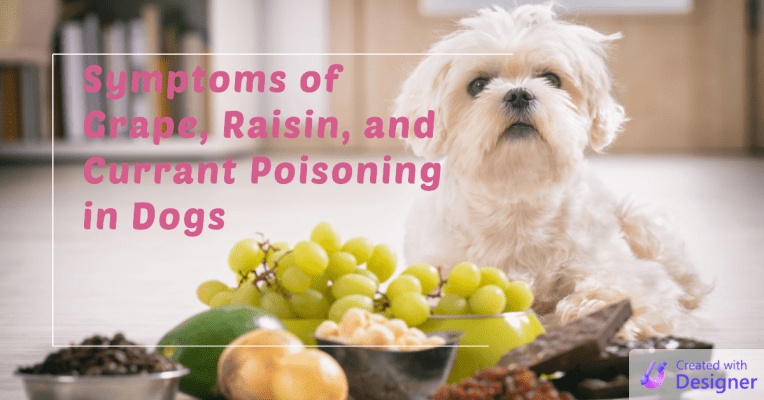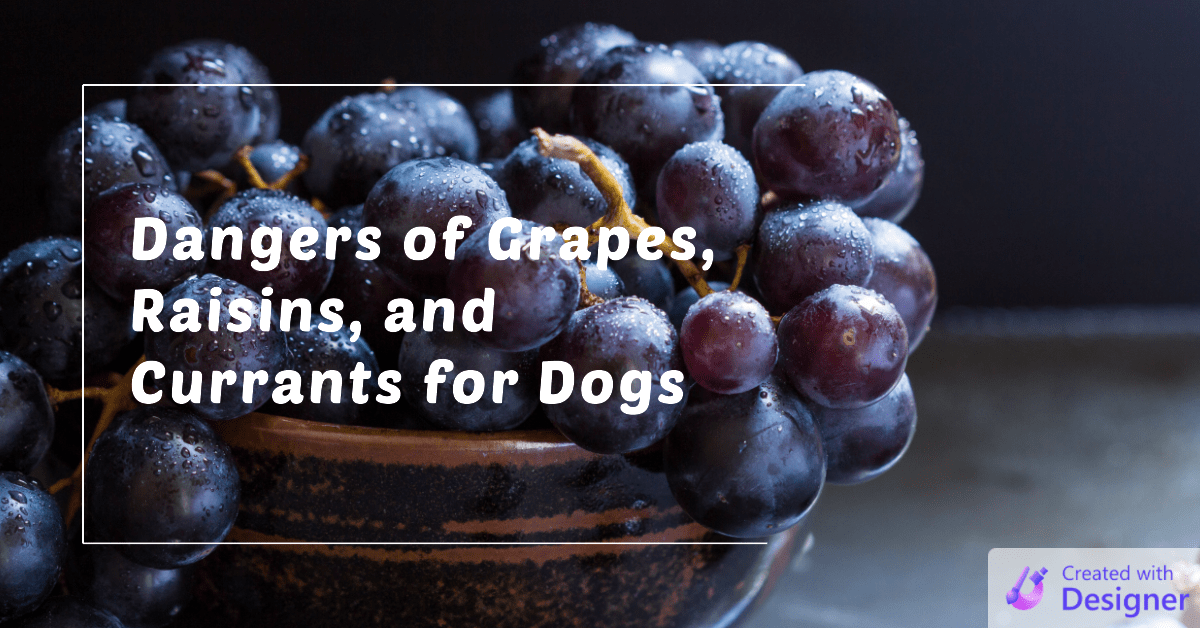MAXX News, MAXX Pet Blogs, pet health and safety
The Hidden Dangers of Grapes, Raisins, and Currants for Dogs: A Comprehensive Guide
Introduction
As pet owners, it is crucial to ensure the safety and well-being of our furry friends. One potential danger that dog owners may not be aware of is the toxicity of Grapes, Raisins, and Currants for Dogs.
This comprehensive guide will provide an in-depth analysis of the risks associated with these seemingly harmless fruits, the symptoms of poisoning, and essential prevention strategies.
Although there are numerous anecdotal reports and clinical observations supporting the toxicity of grapes, raisins, and currants in dogs, the exact mechanism and specific toxin responsible remain unidentified. Some studies have been conducted to investigate this phenomenon, but a definitive explanation has yet to be found.
One study, published in the Journal of Veterinary Internal Medicine, reviewed 180 cases of dogs with a history of grape or raisin ingestion. It found that 50% of the dogs developed clinical signs, and 71% showed evidence of acute kidney injury. However, this study did not identify the exact substance responsible for the toxicity or the precise mechanism of action.
Due to the lack of a definitive explanation and the variability in individual dogs’ reactions, it is challenging to provide a quantitative analysis of the toxicity levels of grapes, raisins, and currants. The table provided earlier is based on general observations and should be taken as a guideline to emphasize the need for caution when it comes to dogs and these fruits.
Further research is needed to fully understand the toxic effects of grapes, raisins, and currants in dogs, and to identify the specific toxin and its mechanism of action.
Reference:
Why are Grapes, Raisins, and Currants Toxic to Dogs?
While the exact substance responsible for grape, raisin, and currant toxicity in dogs remains unknown, it is clear that these fruits pose a significant risk to our canine companions.
The toxin is believed to be present in the flesh of the fruit, and its concentration appears to increase as the fruit dries, making raisins and currants particularly dangerous.
here’s a simple markdown table summarizing the toxicity levels of grapes, raisins, and currants for dogs:
| Fruit | Toxicity Level for Dogs |
|---|---|
| Grapes | Toxic |
| Raisins | More Toxic |
| Currants | Most Toxic |
This table highlights the increasing toxicity levels as the fruits undergo the drying process, with currants being the most dangerous for dogs.
It is important to note that the toxic effects of these fruits are idiosyncratic, meaning that some dogs may experience severe symptoms after ingesting small quantities, while others may show no signs of toxicity despite consuming larger amounts.
Regardless, it is best to err on the side of caution and keep these fruits away from dogs altogether.

Symptoms of Grape, Raisin, and Currant Poisoning in Dogs
Signs of grape, raisin, and currant poisoning in dogs can vary, but they generally appear within 6 to 12 hours of ingestion. Key symptoms to watch for include:
- Vomiting
- Diarrhea
- Lethargy
- Loss of appetite
- Dehydration
- Abdominal pain
- Increased or decreased urination
In severe cases, acute kidney failure may develop, leading to life-threatening complications. Symptoms of kidney failure include:
- Halitosis (bad breath)
- Oral ulcers
- Seizures
- Coma
Diagnosis and Treatment of Grape, Raisin, and Currant Toxicity
If you suspect your dog has ingested grapes, raisins, or currants, contact your veterinarian immediately. Early intervention is critical in minimizing potential damage to your dog’s kidneys.
Your veterinarian may recommend inducing vomiting or administering activated charcoal to reduce toxin absorption.
In cases where kidney damage has occurred, your veterinarian may recommend hospitalization and supportive care, such as intravenous fluids and medications to manage symptoms.
The prognosis for dogs with grape, raisin, or currant poisoning varies depending on the severity of kidney damage and the promptness of treatment.
Prevention Strategies and Tips
The best way to protect your dog from grape, raisin, and currant poisoning is through prevention. Follow these tips to keep your canine companion safe:
- Keep grapes, raisins, and currants out of reach: Store these fruits in sealed containers and place them in high cupboards or locked pantries where your dog cannot access them.
- Educate family members and guests: Ensure that everyone in your household, as well as visitors, are aware of the dangers these fruits pose to dogs. Encourage them to avoid feeding your dog any food containing grapes, raisins, or currants.
- Monitor your dog during walks: Keep a close eye on your dog while outdoors, especially in areas where grapes or currants may be growing. Prevent your dog from ingesting any fallen fruit or scavenging from the ground.
- Check ingredient lists: Some foods and treats may contain raisins or currants as ingredients. Always read labels carefully and avoid giving your dog any products containing these fruits.
Frequently Asked Questions
Q: Can dogs eat grape seed extract or grape juice?
A: It is best to avoid giving your dog any products derived from grapes, including grape seed extract and grape juice. The toxicity of these items is uncertain, and it is better to be safe than sorry.
Q: Are there any breeds more susceptible to grape, raisin, and currant poisoning?
A: Grape, raisin, and currant toxicity appears to affect dogs of all breeds and sizes. The idiosyncratic nature of the toxin makes it difficult to predict which dogs will experience severe symptoms.
Q: What should I do if my dog accidentally ingests grapes, raisins, or currants?
A: If your dog consumes any of these fruits, contact your veterinarian immediately. Prompt treatment is essential to minimize potential harm to your dog’s kidneys.
Conclusion
Grapes, raisins, and currants pose a significant threat to the health and well-being of our canine companions. By understanding the risks associated with these fruits and taking steps to prevent exposure, you can help keep your dog safe and healthy.
Always be vigilant and proactive in safeguarding your pet from potential dangers, and consult your veterinarian if you have any concerns about your dog’s health.
Related posts : Benefits of neutering your pet

